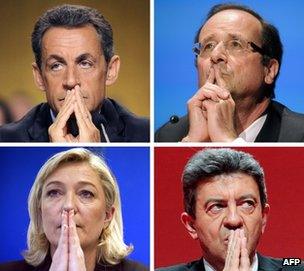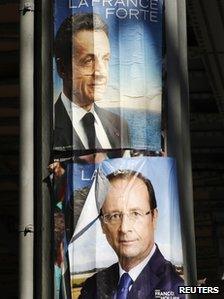French elections: The countdown
- Published
- comments

Nicolas Sarkozy (top L) Francois Hollande (top R), Marine Le Pen and Jean-Luc Melenchon
It is less than 10 days to the first round of voting in the French presidential elections on Sunday April 22nd and the battle lines have been drawn.
President Sarkozy has edged up in the polls but Francois Hollande, the Socialist candidate, remains the favourite to win in the second round.
Increasingly the Sarkozy campaign is trying to make it a vote on crisis management. Hollande - they will tell you - has never run a thing in his life. They present Nicolas Sarkozy as tested and battle-hardened.
It is their calculation that the more dangerous the times, the safer the president appears. A return of the eurozone crisis only makes the case for the experienced leader.
Even though a few weeks ago the French president had declared the eurozone crisis "solved", he now raises the spectre of France finding itself in the same position as Greece or Spain. His campaign spokeswoman, Nathalie Kosciusko-Morizet, said that Francois Hollande wanted to give France "a one-way ticket to Greece".
Economic battleground
The narrative of the Sarkozy camp is that an Hollande victory - with his spending plans - would trigger a speculative attack on the euro and force up borrowing costs for France.
The attacks have forced Francois Hollande to respond: "Sarkozy comes to tell us: 'watch out, it could be even worse if someone else was in charge.' Well, no it couldn't," he said the other night.
And Mr Hollande goes on to remind his audiences that, during the past five years, public debt has grown by 600bn euros (£500bn;$790bn), the triple A rating has been lost and the country is running a trade deficit of 70bn euros. The Hollande team accuses Mr Sarkozy of encouraging market volatility for political ends.
The economy is the key battleground, with the president on Thursday saying that Britain was in "a far worse economic situation than France". Francois Hollande has promised to kick-start growth whilst continuing to cut the deficit. Mr Sarkozy promises to balance the budget by 2016, Mr Hollande by 2017.
The Socialist candidate says:
He will hire 60,000 new teachers and invest heavily in training particularly of young people.
There will be a 75% tax rate for those earning over a million euros.
Fuel prices will be frozen for three months.
There will be an increase in allowances for those with school-age children.
The pension age, only recently increased from 60 to 62, will be lowered again.
The Sarkozy camp dismisses this as a tax and spend programme with dangerous consequences. "If we start hiring civil servants, if we start spending again," says the French President, "if we throw the pension reform into question, it's not a risk that interest rates will rise, it's a certainty".
Mr Sarkozy has promised billions in budget savings but Mr Hollande says that the current policies are not working and his emphasis will be on growth rather than austerity.
Air of unreality

The Sarkozy camp has attacked Mr Hollande's spending plans
These political arguments rage in a climate where across the political spectrum there is hostility towards financiers, bankers and the rich.
On the far right, Marine le Pen rails against globalisation which she says has left an elite rich and ordinary people without jobs. Francois Hollande has declared the world of finance his enemy. Sarkozy is going to force tax exiles to pay taxes.
On the far left, Jean-Luc Melenchon, who calls himself the sound and the fury, wants to confiscate all earnings above £300,000 a year. He is warning that during the final weeks of the campaign or shortly after the "world of international finance is going to attack France".
Only this week Francois Hollande said "what I want is for us to show France but also Europe that we have a shared capacity to dominate finance".
There is an air of unreality about the campaign. Whoever wins will have to make deep spending cuts. The savings cannot all come from tax increases. Next year France will have to raise 200bn euros from the markets.
And the biggest question is hardly raised at all.
Is the French system with its generous social benefits sustainable into the future?
Already public spending runs at 56% of GDP, the highest in Europe. Can the French way of life be stubbornly defended or will there have to be compromise?
There are no votes in such questions, however.
Ironically, the deeper the financial crisis the greater may be President Sarkozy's chances of staying in office.